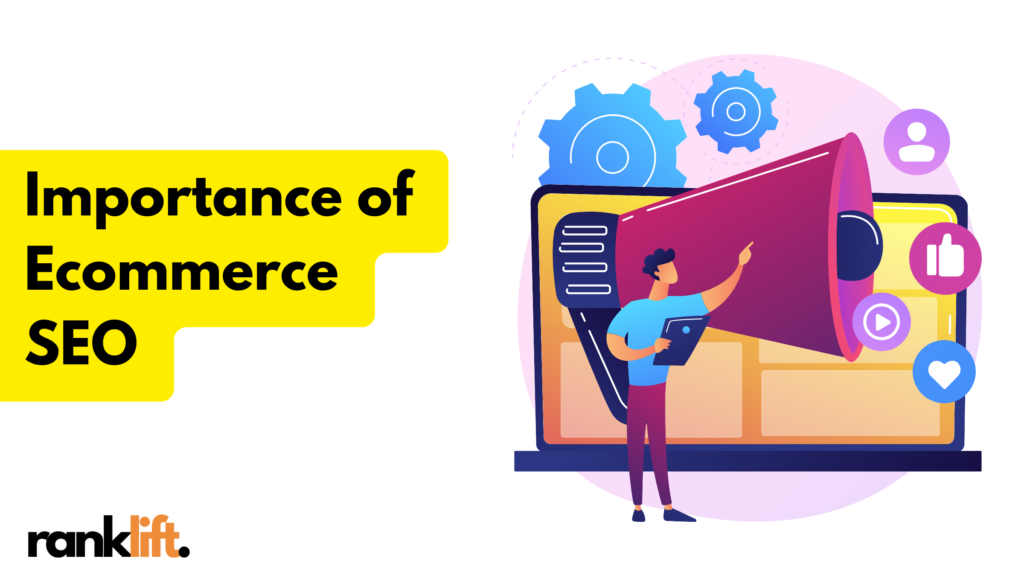In today’s digital age, having a strong online presence is crucial for the success of any ecommerce business. With millions of websites competing for attention, it can be challenging to stand out and attract customers to your online store. That’s where ecommerce SEO comes in.
Ecommerce SEO, or search engine optimization, is the process of optimizing your online store to rank higher in search engine results pages (SERPs). By implementing effective SEO strategies, you can increase your website’s visibility, drive targeted traffic, and ultimately boost your online sales.

The Benefits of Ecommerce SEO
Implementing a comprehensive ecommerce SEO strategy can offer numerous benefits for your online business. Let’s explore some of the advantages:
1. Increased Organic Traffic
Organic traffic refers to the visitors who find your website through unpaid search results. By optimizing your website for relevant keywords, you can improve your search engine rankings and attract more organic traffic. Studies have shown that websites ranking at the top of search results receive a significant share of the clicks, with the first position alone capturing 34.6% of the traffic.
2. Improved Brand Authority
Ecommerce SEO goes beyond just driving traffic to your website. It also involves content marketing strategies that help build brand authority. By creating informative and valuable content related to your products or industry, you can establish yourself as an expert in your field. This not only boosts your credibility but also helps in gaining the trust of potential customers.
3. Targeted Traffic and Higher Conversions
Keyword research plays a crucial role in ecommerce SEO. By identifying the keywords and phrases that your target audience uses when searching for products, you can optimize your website to attract highly targeted traffic. This means that the visitors coming to your site are more likely to convert into customers, resulting in higher sales and revenue.
4. Enhanced User Experience
Ecommerce SEO involves not only optimizing your website for search engines but also improving the overall user experience. Factors such as website speed, navigation, and mobile-friendliness are taken into consideration to ensure that visitors have a seamless and enjoyable browsing experience. A well-optimized website that is easy to navigate and loads quickly can significantly reduce bounce rates and keep visitors engaged.
5. Long-Term Results and ROI
Unlike paid advertising campaigns that require continuous investment, the effects of ecommerce SEO can last for a long time. Once your website starts ranking higher in search results, it can continue to attract organic traffic and generate sales even after the initial optimization efforts. This makes ecommerce SEO a cost-effective strategy with a high return on investment (ROI) in the long run.
Key Ecommerce SEO Strategies
To achieve success with ecommerce SEO, it’s essential to implement a variety of strategies that address different aspects of optimization. Let’s take a closer look at some key strategies:
1. On-Page SEO
On-page SEO focuses on optimizing the elements on your website that are directly under your control. This includes keyword research and implementation, optimizing page titles, meta descriptions, headings, and URLs, as well as improving the overall content quality. By ensuring that your website’s pages are well-optimized, you can increase their visibility in search results and attract more organic traffic.
2. Technical SEO
Technical SEO involves optimizing the technical aspects of your website to improve its search engine visibility. This includes optimizing website speed, improving site structure and navigation, implementing schema markup, and ensuring proper indexing by search engine crawlers. Technical SEO plays a crucial role in ensuring that search engines can crawl and understand your website effectively.
3. Off-Page SEO
Off-page SEO refers to the actions taken outside of your website to improve its visibility and authority. One of the most important aspects of off-page SEO is link building, which involves acquiring high-quality backlinks from reputable websites. Link building helps search engines recognize the value and trustworthiness of your website, leading to higher rankings. Other off-page SEO strategies include social media engagement, digital PR, and content marketing.
4. Content Creation
Content marketing is an integral part of ecommerce SEO. By creating high-quality, informative, and engaging content, you can attract more organic traffic, establish your brand as an authority, and improve user experience. Content can take various forms, such as blog posts, articles, videos, infographics, and more. It’s important to create content that is relevant to your target audience and addresses their needs and pain points.
5. Local SEO
If your ecommerce business has a physical presence or serves a specific geographic area, implementing local SEO strategies is crucial. This involves optimizing your website for location-based keywords, creating and optimizing your Google Business profile, managing local listings, and ensuring consistency across online directories. Local SEO helps you target customers in your area and drive foot traffic to your physical store, if applicable.
Choosing the Right Ecommerce SEO Agency
Implementing a successful ecommerce SEO strategy requires expertise and experience. Choosing the right ecommerce SEO agency can make a significant difference in the success of your online business. Here are some factors to consider when selecting an agency:
1. Experience and Expertise
Look for an agency with a proven track record in ecommerce SEO. Check their portfolio and client testimonials to assess their experience and expertise in the field. An agency that specializes in ecommerce SEO will have a deep understanding of the unique challenges and requirements of online stores.
2. Customized Approach
Every ecommerce business is unique, and a one-size-fits-all approach to SEO may not yield the best results. Ensure that the agency you choose offers a customized approach tailored to your specific business goals and industry. They should have the ability to adapt their strategies to meet the challenges presented by your website.
3. Transparent Reporting and Communication
Transparency is crucial when working with an ecommerce SEO agency. Look for an agency that provides regular and detailed reports on the progress of your SEO campaign. They should be transparent about the tasks they have completed, the strategies they are implementing, and the results achieved. Open and clear communication is also essential, so ensure that the agency is responsive and accessible.
4. Focus on Results and ROI
A reliable ecommerce SEO agency should prioritize the overall success of your online business. They should focus not only on driving traffic to your website but also on improving conversions and generating revenue. Look for an agency that emphasizes the quality of work and the impact it has on your bottom line, rather than solely focusing on quantity.
Conclusion
Ecommerce SEO is a powerful strategy that can significantly impact the success of your online business. By implementing effective SEO strategies, you can increase your website’s visibility, attract targeted traffic, and drive higher conversions. Choosing the right ecommerce SEO agency is crucial to ensure that your website is optimized for search engines and delivers a seamless user experience. With the right expertise and a customized approach, you can achieve long-term success and stay ahead of the competition in the ever-evolving digital landscape. So, invest in ecommerce SEO today and unlock the full potential of your online store.


